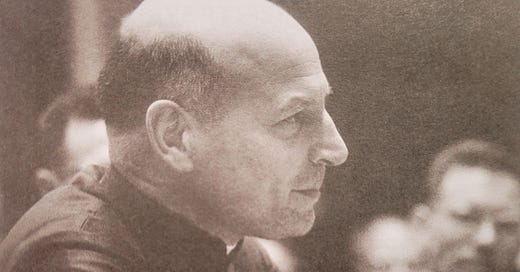Abbé de Nantes and his group 'The Contre-Réforme Catholique' (CRC)
Is a re-evaluation of the CRC's hostilities towards other traditional Catholics possible?
We just made a long-lost text available, possibly for the first time ever online.
This text was written in 1975 by l’Abbé Georges de Nantes, founder of the French group La Contre-réforme Catholique (CRC) based in Champagne, France. Today, the group is headed by a religious brother, Frère Bruno Bonnet-Eymard.
But who was Abbé de Nantes?
About Abbé de Nantes and the CRC
First thing's first. “Abbé” does not mean “abbot” – it is the standard address to a secular priest. “De Nantes” was his surname, rather than an indication of where he was from.
De Nantes was an important figure in the early traditionalist milieu. There is a lot that could be said about him and his career. In 1973, he famously submitted a “Book of Accusation,” against Paul VI to Rome, accusing him of heresy, schism and scandal. This book has contributed to some well-known Anglophone clergy rejecting the post-Vatican II claimants to the papacy.
We’ve made the article in question available as a matter of historical interest. As far as we know, this article has only been available online in English, and it seems quite unlikely that many of those attached to the CRC are aware of its contents.
This article also contains opinions which we consider to be false, misleading and dangerous. Indeed, l’Abbé de Nantes warns about some of the dangers of his own conclusions in the text itself. In the French version, we included some notes and comments within the text itself to explain these points.
So why make it available at all?
It’s about setting the record straight between Catholics.
The CRC professes to reject Vatican II, and takes a strong verbal stand on issues such as religious liberty. It has a strong musical tradition, and is impressive in its formation of young people in a spirit of piety and sacrifice. It has produced some admirable fruits.
Nonetheless, their rejection of Vatican II is mixed up with acceptance of many aspects of the conciliar church, as well as several innovations and deviations from orthodoxy (e.g., on the theology of the Holy Eucharist – see below).
In recent years or decades, the CRC have even developed a noticeable suspicion – and even hostility – towards traditionalists, and those who avoid the Novus Ordo on principle, and attend exclusively the traditional Latin Mass in use before the reforms of Vatican II.
But this “lost article” which we’ve published from them takes quite a different approach.
It is our hope that by publishing it in French, the tolerance expressed may lead to a re-evaluation of certain hostilities borne by the contemporary CRC towards other traditional Catholics.
But first, let’s give some more context to this man and his group, both of which were very important in the initial traditionalist reaction to Vatican II.




